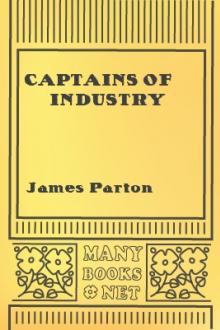Captains of Industry - James Parton (the false prince txt) 📗

- Author: James Parton
- Performer: -
Book online «Captains of Industry - James Parton (the false prince txt) 📗». Author James Parton
The reader is aware that during the last years of the reign of Louis XIV., France suffered a series of most disastrous defeats from the allied armies, commanded by the great English general, the Duke of Marlborough. It was these four able brothers who supplied the French army with provisions during that terrible time; and I do not hesitate to say, that, on two or three critical occasions, it was their energy and intelligence that saved the independence of their country. Often the king's government could not give them a single louis-d'or in money when a famishing army was to be supplied. On several occasions they spent their whole capital in the work and risked their credit. There was one period of five months, as they used afterwards to say, when they never once went to bed sure of being able to feed the army the next day. During those years of trial they were sustained in a great degree by the confidence which they inspired in their honesty, as well as in their ability. The great French banker and capitalist then was Samuel Bernard. On more than one occasion Bernard saved them by lending them, on their personal security, immense sums; in one crisis as much as three million francs.
We can judge of the extent of their operations, when we learn that, during the last two years of the war, they had to supply a hundred and eighty thousand men in the field, and twenty thousand men in garrison, while receiving from the government little besides depreciated paper.
Peace came at last; and it came at a moment when the whole capital of the four brothers was in the king's paper, and when the finances were in a state of inconceivable confusion. The old king died in 1715, leaving as heir to the throne a sickly boy five years of age. The royal paper was so much depreciated that the king's promise to pay one hundred francs sold in the street for twenty-five francs. Then came the Scotch inflator, John Law, who gave France a brief delirium of paper prosperity, ending with the most woful and widespread collapse ever known. It was these four brothers, but especially the third brother, Joseph Paris, known in French history as Paris-Duverney, who, by labors almost without example, restored the finances of the country, funded the debt at a reasonable interest, and enabled France to profit by the twenty years of peace that lay before her.
There is nothing in the whole history of finance more remarkable than the five years' labors of these brothers after the Law-mania of 1719; and it is hardly possible to overstate the value of their services at a time when the kingdom was governed by an idle and dissolute regent, and when there was not a nobleman about the court capable of grappling with the situation. The regent died of his debaucheries in the midst of their work. The Duke of Bourbon succeeded him; he was governed by Madame de Prie; and between them they concocted a nice scheme for getting the young king married, who had then reached the mature age of fifteen. The idea was to rule the king through a queen of their own choosing, and who would be grateful to them for her elevation.
But it turned out quite otherwise. The king, indeed, was married, and he was very fond of his wife, and she tried to carry out the desires of those who had made her queen of France. But there was an obstacle in the way; and that obstacle was the king's unbounded confidence in his tutor, the Abbé de Fleury, a serene and extremely agreeable old gentleman past seventy. A struggle arose between the old tutor and Madame de Prie for the possession of the young king. The tutor won the victory. The Duke of Bourbon was exiled to his country-seat, and Madame de Prie was sent packing. Paris-Duverney and his first clerk were put into the Bastille, where they were detained for two years in unusually rigorous imprisonment, and his three brothers were exiled to their native province.
Another intrigue of court set them free again, and the four brothers were once more in Paris, where they continued their career as bankers, contractors, and capitalists as long as they lived, each of them acquiring and leaving a colossal fortune, which their heirs were considerate enough to dissipate. It was Paris-Duverney who suggested and managed the great military school at Paris, which still exists. It was he also who helped make the fortunes of the most celebrated literary men of his time, Voltaire and Beaumarchais. He did this by admitting them to a share in army contracts, one of which yielded Voltaire a profit of seven hundred thousand francs, which, with good nursing, made him at last the richest literary man that ever lived.
Paris-Duverney was as good a man and patriot as a man could well be who had to work with and under such persons as Louis XV. and Madame de Pompadour. By way of showing what difficulties men had to overcome who then desired to serve their country, I will mention a single incident of his later career.
His favorite work, the École Militaire, of which he was the first superintendent, shared the unpopularity of its early patron, Madame de Pompadour, and long he strove in vain to bring it into favor. To use the narrative of M. de Loménie, the biographer of Beaumarchais:—
"He was constantly at court, laboring without cessation on behalf of the military school, and soliciting the king in vain to visit it in state, which would have given a sort of prestige. Coldly received by the dauphin, the queen, and the princesses, he could not, as the friend of Madame de Pompadour, obtain from the nonchalance of Louis XV. the visit which he so much desired, when the idea struck him, in his despair, of having recourse to the young harpist, who appeared to be so assiduous in his attendance on the princesses, and who directed their concert every week. Beaumarchais understood at once the advantage he might derive from rendering an important service to a clever, rich, old financier, who had still a number of affairs in hand, and who was capable of bringing him both wealth and advancement. But how could a musician without importance hope to obtain from the king what had already been refused to solicitations of much more influence than his own? Beaumarchais went to work like a man who had a genius for dramatic intrigue and a knowledge of the human heart.
"We have shown that, while he was giving his time and attention to the princesses, he never asked for anything in return. He thought that if he were fortunate enough to persuade them, in the first instance, to pay a visit to the École Militaire, the curiosity of the king perhaps would be excited by the narrative of what they had seen, and would lead him to do that which he would never have been prompted to do by justice. He accordingly represented to the princesses not only the equitable side of the question, but also the immense interest which he himself had in obtaining this favor for a man who might be of great use to him. The princesses consented to visit the École Militaire, and Beaumarchais was granted the honor of accompanying them. The director received them with great splendor; they did not conceal from him the great interest they took in their young protégé, and some days afterward Louis XV., urged by his daughters, visited it himself, and thus gratified the wishes of old Duverney.
"From this moment the financier, grateful for Beaumarchais' good services, and delighted to find a person who could assist him as an intermediary in his intercourse with the court, resolved to make the young man's fortune. He began by giving him a share in one of his speculations to the amount of sixty thousand francs, on which he paid him interest at the rate of ten per cent.; after this, he gave him an interest in various other affairs. 'He initiated me,' says Beaumarchais, 'into the secrets of finance, of which, as every one knows, he was a consummate master.'"
Such was government in the good old times! I like to think of it when things go amiss in Washington or Albany. Let our rulers do as badly as they may, they cannot do worse than the rulers of the world did a century and a half ago. If any good or great thing was done in those days, it was done in spite of the government.
SIR ROWLAND HILL.The poet Coleridge, on one of his long walks among the English lakes, stopped at a roadside inn for dinner, and while he was there the letter-carrier came in, bringing a letter for the girl who was waiting upon him. The postage was a shilling, nearly twenty-five cents. She looked long and lovingly at the letter, holding it in her hand, and then gave it back to the man, telling him that she could not afford to pay the postage. Coleridge at once offered the shilling, which the girl after much hesitation accepted. When the carrier was gone she told him that he had thrown his shilling away, for the pretended letter was only a blank sheet of paper. On the outside there were some small marks which she had carefully noted before giving the letter back to the carrier. Those marks were the letter, which was from her brother, with whom she had agreed upon a short-hand system by which to communicate news without expense. "We are so poor," said she to the poet, "that we have invented this manner of corresponding and sending our letters free."
The shilling which the postman demanded was, in fact, about a week's wages to a girl in her condition fifty years ago. Nor was it poor girls only who then played tricks upon the post-office. Envelopes franked by honorable members of Parliament were a common article of merchandise, for it was the practice of their clerks and servants to procure and sell them. Indeed, the postal laws were so generally evaded that, in some large towns, the department was cheated of three quarters of its revenue. Who can wonder at it? It cost more then to send a letter from one end of London to the other, or from New York to Harlem, than it now does to send a letter from Egypt to San Francisco. The worst effect of dear postage was the obstacles it placed in the way of correspondence between poor families who were separated by distance. It made correspondence next to impossible between poor people in Europe and their relations in America. Think of an Irish laborer who earned sixpence a day paying seventy-five cents to get news from a daughter in Cincinnati! It required the savings of three or four months.
The man who changed all this, Sir Rowland Hill, died only three years ago at the age of eighty-three. I have often said that an American ought to have invented the new postal system; and Rowland Hill, though born and reared in England, and descended from a long line of English ancestors, was very much an American. He was educated on the American plan. His mind was American, and he had the American way of looking at things with a view to improving them.
His father was a Birmingham schoolmaster, a free trader, and more than half a republican. He brought up his six sons and two daughters to use their minds and their tongues.





Comments (0)